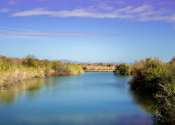Spring irrigation can reduce summer heat wave events
Heat waves are becoming more extreme as climate change exacerbates, with susceptible locations experiencing more frequent, prolonged and higher intensity events. As such, they pose a hazard to agricultural practices that ...









